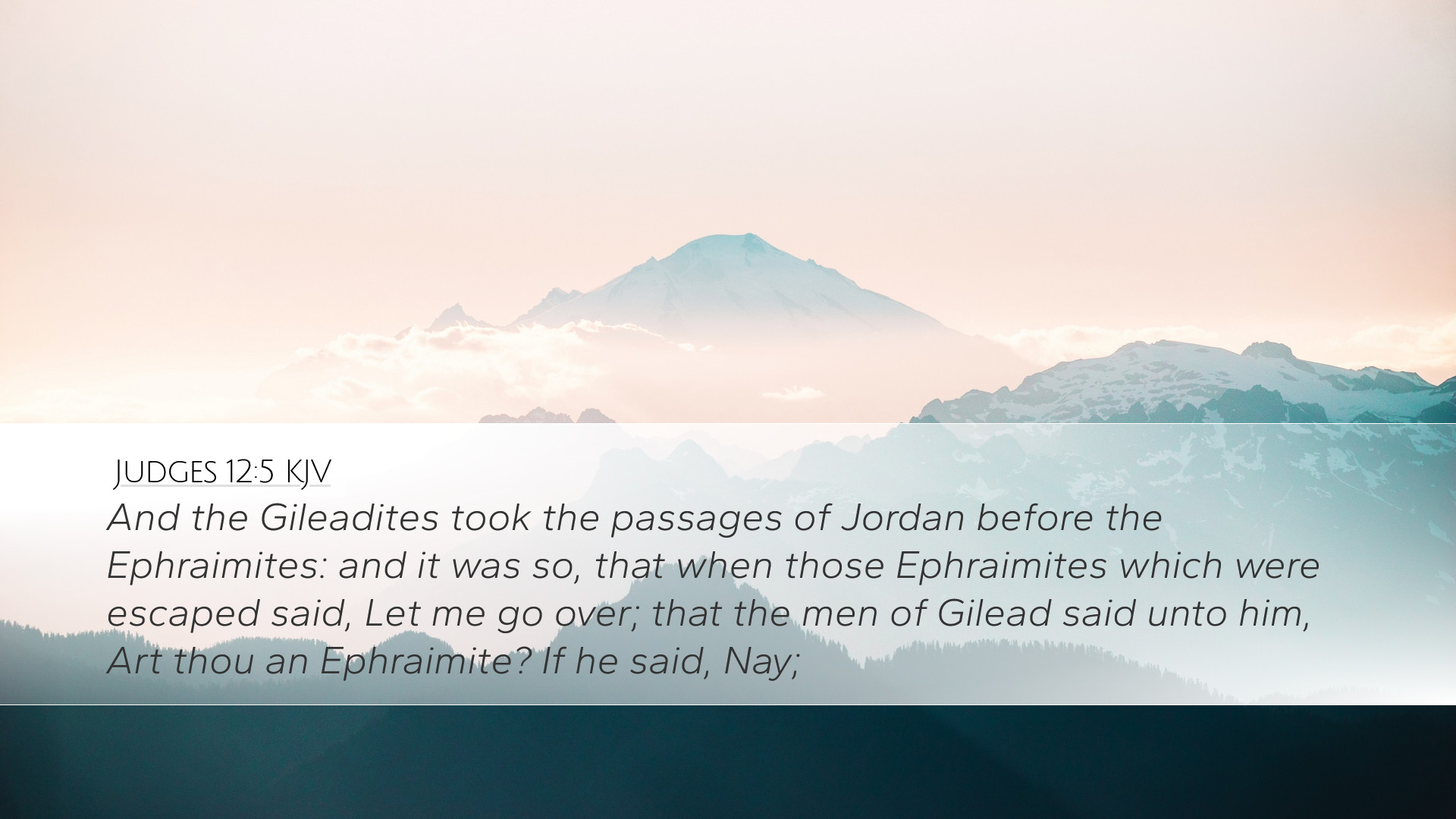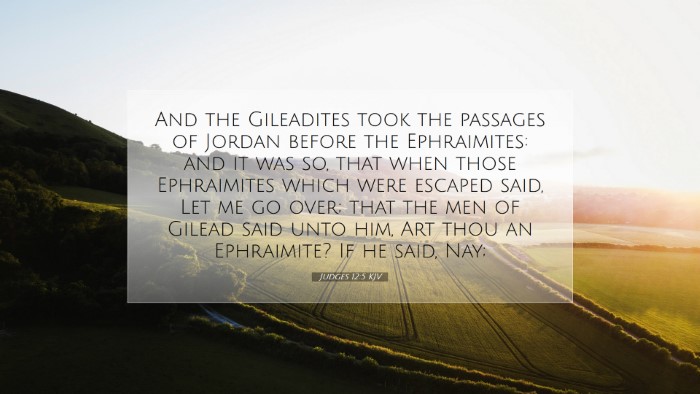Old Testament
Genesis Exodus Leviticus Numbers Deuteronomy Joshua Judges Ruth 1 Samuel 2 Samuel 1 Kings 2 Kings 1 Chronicles 2 Chronicles Ezra Nehemiah Esther Job Psalms Proverbs Ecclesiastes Song of Solomon Isaiah Jeremiah Lamentations Ezekiel Daniel Hosea Joel Amos Obadiah Jonah Micah Nahum Habakkuk Zephaniah Haggai Zechariah MalachiJudges 12:5
Judges 12:5 KJV
And the Gileadites took the passages of Jordan before the Ephraimites: and it was so, that when those Ephraimites which were escaped said, Let me go over; that the men of Gilead said unto him, Art thou an Ephraimite? If he said, Nay;
Judges 12:5 Bible Commentary
Commentary on Judges 12:5
Judges 12:5 states, "And the Gileadites took the passages of Jordan before the Ephraimites: and it was so, that when those Ephraimites which were escaped said, let me go over; that the men of Gilead said unto him, Art thou an Ephraimite? If he said, Nay;
This verse encapsulates the tension between the Gileadites and the Ephraimites during a crucial moment in Israel’s history. The significance of this passage can be explored through various dimensions, including historical context, theological implications, and moral lessons.
Historical Context
The events in Judges 12 occur after a series of battles in which the Israelites, led by Jephthah, confront their enemies. The Gileadites, from the tribe of Manasseh, find themselves in a pivotal role during this conflict, particularly in their interaction with the Ephraimites, a tribe often at odds with the Gileadites.
-
Matthew Henry's Commentary:
Henry emphasizes the significance of the Jordan River as a geographical and strategic barrier. The Gileadites took command of the fords, demonstrating tactical prowess and the necessity of defense during times of conflict.
-
Albert Barnes' Notes:
Barnes elaborates on the scenarios faced by the Ephraimites, who were seeking passage and the Gileadites' response, highlighting themes of identity and the disputes that often arose among the tribes of Israel.
-
Adam Clarke's Commentary:
Clarke delves into the linguistic elements of the passage, noting how the Gileadites used a unique test to identify Ephraimites based on their inability to pronounce "Shibboleth" correctly, examining the deeper implications of language and belonging.
Theological Implications
This passage invites readers to consider themes of conflict within the community, particularly among God’s chosen people. It reveals the complexities of tribal identity and the implications of belonging in the context of unity and division.
-
Unity and Division:
The Gileadites' actions underscore how internal strife can manifest among God’s people, raising questions about unity in Christ and the importance of reconciliation.
-
Judgment and Identification:
This episode serves as a grim reminder of the consequences of strife, as the Gileadites' tests led to the condemnation of those mistakenly identified as the enemy. It challenges the reader to reflect on their own judgments and assumptions about others.
Moral Lessons
Judges 12:5 provides practical lessons salient for today’s believers, particularly for pastors and leaders. The tension depicted serves as a caution against divisiveness, while also illuminating potential paths for peace and understanding.
-
Discernment:
The necessity of discernment in leadership is paramount, illustrating how careful evaluation, akin to the Gileadites' questioning, can prevent misguided actions and resolve conflicts effectively.
-
Communication:
The importance of clear communication and understanding one another's perspectives is highlighted. Ignoring linguistic or cultural differences can lead to misunderstandings that escalate conflict.
-
Community Involvement:
This scripture calls for proactive community involvement and the resolution of tensions within communities of faith. It challenges leaders to foster environments where dialogue is encouraged, and each voice is valued.
Conclusion
In conclusion, Judges 12:5 provides profound insights into tribal conflict, identity, and the nature of community. By examining the historical context, theological implications, and moral lessons present in this passage, readers are invited to engage thoughtfully with the text, applying its wisdom to contemporary issues in churches and communities today.
Pastors, students, theologians, and Bible scholars are urged to reflect on this verse not only as a narrative of conflict but as an allegory of their own relational dynamics, encouraging a deeper introspection toward harmony and understanding among believers.


